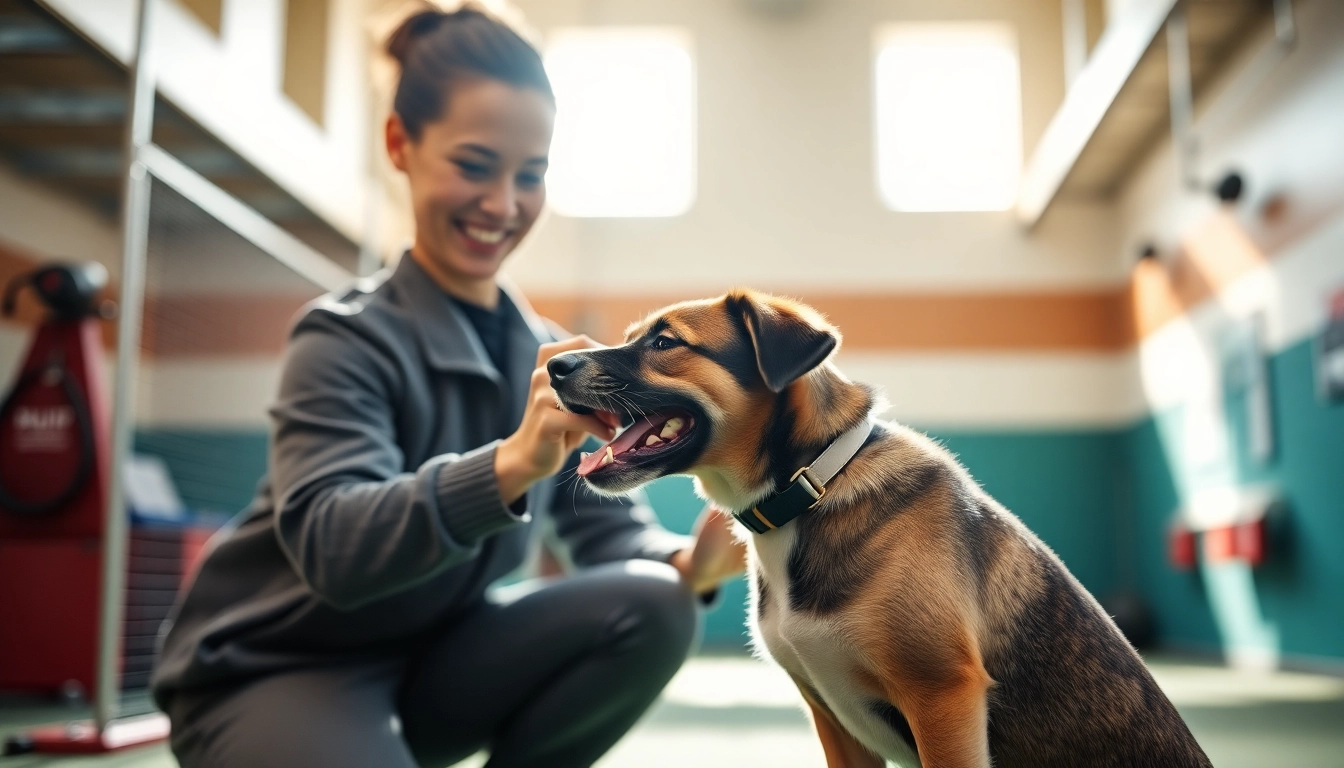
Understanding Dog Training Essentials
Dog training is an essential aspect of responsible pet ownership. It ensures that your furry friend is well-behaved, obedient, and safe. In a bustling city like Houston, with its diverse environments and canine-friendly activities, skilled training can enhance the bond between you and your dog exponentially. As you consider dog training in Houston, it’s vital to grasp what you can expect, the techniques involved, and how to choose the right program tailored for your dog’s needs. Utilizing quality resources, such as Dog training Houston, will prove helpful in navigating this essential journey.
What to Expect from Dog Training Houston
When enrolling your dog in training programs around Houston, it’s pivotal to understand what to anticipate. Most training programs will focus on basic commands, socialization skills, and behavioral adjustments. Training is typically categorized into classes tailored for different stages and types of dogs, including puppies, adult dogs, and those with specific behavioral issues.
Expect programs to range in duration from a few weeks to several months, depending on the method and the dog’s unique needs. Regular communication with trainers and consistent practice at home are key components for success. Most importantly, a well-structured training program will offer flexibility, catering to your schedule and needs while focusing on positive reinforcement techniques.
Key Training Techniques and Their Benefits
Professionals utilizing top techniques in dog training practices focus on positive reinforcement, clicker training, and behavioral modification strategies. Positive reinforcement involves rewarding desired behaviors with treats or praise, encouraging dogs to repeat those actions. Clicker training adds a sound cue, pairing the click with a reward to enhance learning.
Behavioral modification strategies address specific issues, such as aggression or excessive barking. Trainers typically develop a tailored plan, assessing the cause and implementing appropriate actions over time. These techniques foster a positive learning environment, making it easier for dogs to learn while strengthening the human-animal bond.
Choosing the Right Dog Training Program
Selecting the best program for your canine companion is essential. Considerations include the trainer’s philosophy, the training environment, and previous success stories from other pet owners. An ideal program should provide a combination of classroom instruction and hands-on practice to reinforce lessons learned.
Investigate the qualifications of trainers as well as their approach to behavior management, ensuring that they align with your expectations and philosophy. If possible, observe a class in action to gauge the interaction between trainers, the dogs, and their owners before making a decision.
Training Programs Available in Houston
Houston offers a variety of dog training programs aimed at meeting the needs of diverse breeds and temperaments. From foundational puppy classes to specialized behavioral training, there’s something for every dog owner.
Puppy Training Classes for Early Socialization
Puppy training classes are particularly important for socialization, teaching puppies how to interact safely with people and other dogs. Early experiences can significantly influence their behavior as adults. Classes typically focus on fundamental commands and expose puppies to new environments, sounds, and sights that shape their future behavior.
Socialization is crucial during the first few months of life when puppies are most impressionable. Attending puppy kindergarten classes can enhance their confidence and help prevent later behavioral issues. Owners should look for programs that create a positive and safe environment while gradually introducing various stimuli.
Obedience Training: Building You and Your Dog’s Skills
Obedience training builds on the foundation established in puppy classes, focusing on commands such as sit, stay, come, and heel. This type of training is vital for ensuring that your dog behaves appropriately in public spaces, contributing to overall safety.
Finding a reliable obedience training program is crucial, as it often encompasses on-leash skills and off-leash control, instilling discipline. Training sessions can vary in style, including private sessions, group classes, or comprehensive board-and-train packages that immerse dogs in daily learning.
Specialized Training: Beyond Basic Commands
For dogs that require more than just basic obedience, specialized training can address issues like anxiety, aggression, or unique service needs. Programs may focus on therapy dog certification, advanced agility skills, tracking activities, or behavioral rehabilitation. Trainers who specialize in specific challenges often incorporate a comprehensive understanding of canine psychology, applying different methods to resolve complex issues.
Additionally, therapy and service dog training can exponentially increase a dog’s utility, allowing them to assist individuals with disabilities, emotional needs, or even in medical emergencies. Choosing the right specialized program can empower your dog to develop essential skills while positively impacting the lives of others.
Benefits of Professional Dog Training
The advantages of enrolling your dog in a professional training program extend far beyond basic obedience. Investing in dog training leads to a wealth of benefits for both owners and pets alike.
Enhancing the Owner-Pet Relationship
One of the most significant benefits of training is the enhancement of the bond between owner and pet. Through regular training sessions, you establish open communication with your dog, allowing them to understand your expectations and respond to commands effectively. This connection cultivates trust and a sense of security, which fosters a well-rounded relationship.
Moreover, knowing how to communicate effectively with your dog reduces frustrations and miscommunications, ultimately leading to a more harmonious household. The strong bond formed through training creates a lasting partnership that enhances the dog owner’s experience.
Long-term Behavioral Benefits
One of the biggest advantages of professional dog training is the long-term behavioral benefits received by both dogs and their owners. Active engagement in training significantly decreases the likelihood of behavioral problems like excessive barking, biting, and disobedience. By learning commands and expectations at an early stage, dogs can generalize these skills into their daily interactions.
With a strong training foundation, dogs become more adaptable to new situations and environments, enabling them to behave appropriately in various scenarios. This adaptability and discipline ensure a positive behavior pattern throughout the dog’s life.
Preventing Common Dog Behavioral Issues
Professional training provides crucial tools for dog owners to manage and prevent behavioral challenges effectively. By identifying and addressing issues early, such as fear or aggression, training reduces the possibility of these behaviors escalating over time.
Program instructors often teach owners techniques to curtail negative behaviors while reinforcing positive ones. Furthermore, ongoing support and guidance help owners navigate challenges as they arise, ensuring that dogs stay on track even after completing formal training.
Choosing a Dog Trainer in Houston
Finding a qualified dog trainer is essential for your dog’s overall development and wellbeing. This process is substantially beneficial in ensuring successful training outcomes, aligning the trainer’s qualifications and methodologies with your goals.
How to Find Qualified Trainers
To locate qualified dog trainers in Houston, begin by researching local facilities, client reviews, and training methodologies. Online directories and community resources can provide valuable insights into reputable trainers in your area. Referrals from fellow dog owners or veterinarians also bolster your search. Furthermore, discussing your training goals with potential trainers ensures they possess the skills to meet your needs.
Attend local dog shows or community events where trainers showcase their skills for further insights into their training methods, philosophies, and successes.
What Questions to Ask When Hiring a Trainer
When narrowing down potential trainers for your canine companion, it’s essential to ask specific questions to gauge their expertise. Inquire about their experience, training philosophy, and the types of techniques they use. Questions about how they handle certain behavioral issues and their approach to positive reinforcement can also provide critical insights.
Moreover, understanding the structure of their training programs, including class size and duration, can help establish whether they align with your schedule and preferences. Know their policy on follow-up support or classes as well, as continuous development is often necessary in dog training.
Checking Certifications and Training Styles
Currently, the dog training industry lacks standardized certification requirements, making it essential for potential clients to do due diligence. Look for trainers with certifications from reputable organizations, such as the Association of Professional Dog Trainers (APDT) or the International Association of Animal Behavior Consultants (IAABC).
Understanding the trainer’s training style is equally important, as various philosophies like dominance-based training versus positive reinforcement can produce significantly different results. Aligning training styles with your own beliefs about animal care can ensure a smoother training experience.
Cost Considerations for Dog Training in Houston
When budgeting for dog training, it’s vital to consider the various factors impacting the overall costs. Evaluating the cost of services ensures you make informed financial decisions while still meeting your dog’s training needs.
Typical Pricing for Different Training Programs
The pricing for dog training in Houston can vary significantly depending on the type of program and the trainer’s experience. Basic obedience classes may range from $50 to $200 per session, while more specialized training can reach upwards of several hundred to thousands of dollars.
Private training sessions often incur higher rates than group classes, which can benefit a broader audience. Furthermore, board-and-train programs typically include more intensive training, resulting in higher fees, but may offer a comprehensive solution for especially challenging behaviors.
Understanding Value vs. Cost in Dog Training
When evaluating dog training costs, it’s crucial to consider value versus price. A more expensive program might provide a higher level of expertise and training methodology, ultimately yielding better long-term results. Understanding the differences in service offerings and training styles will provide additional context to weigh your options effectively.
While lower rates might be appealing, dog owners should consider the potential value of more comprehensive programs that develop well-behaved and socially adept pets. Besides, investing in quality training upfront can prevent costly behavioral issues over time.
Budgeting for Your Dog’s Training Needs
Appropriate budgeting for dog training requires a comprehensive assessment of what services are necessary for your dog’s improvement. Create a clear list of training objectives, and consider allocating funds not just for one-time sessions but also for ongoing training classes if your dog requires extra help.
Keep in mind that training is an investment in your pet’s future behavior, safety, and overall happiness. Effective budgeting ensures you can invest in quality training, setting the foundation for a supportive training plan that allows your dog to thrive.







